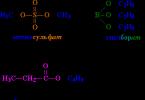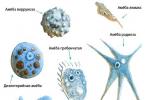“Leaves” is an example of F. I. Tyutchev’s early work. In this work, the author intertwined fairy-tale, landscape and philosophical motifs. They study it in 6th grade. We suggest making your preparation for the lesson easier by using a brief analysis of “Leaves” according to the plan.
Brief Analysis
History of creation- the work was written in 1830, when the poet was serving in Germany. “Leaves” was first published in 1879 in the Russian Archive magazine.
Theme of the poem– reflections of leaves about their “life”; contrasting cold calm with rebellious nature.
Composition– The poem is written in the form of a monologue of leaves. In its meaning, several parts can be distinguished: the reflections of leaves about the needles, the comparison of “skinny greenery” with its beauty and the decision to fly away with the wind. The work consists of four octaves.
Genre- elegy.
Poetic size– two-foot amphibrachium, cross rhyme ABAB.
Metaphors – “pines and spruces... wrapped in snow and blizzards, they sleep”, “we are an easy tribe”, “ short time we are visiting on the branches,” “the marshmallows are gone.”
Epithets – "skinny greens", “red summer”, “bothersome branches”, “violent winds”.
Comparisons – “green, like hedgehog needles.”
History of creation
The analysis of the poem should begin with the history of its writing. In 1821, Fyodor Ivanovich went to serve in Germany. Being a diplomat, the man did not forget about his talent for poetic art. Philosophical motives play an important role in his “Munich” works. Apparently, this is due to the fact that in Germany the poet met the philosopher Schelling, who defended the idea of the unity of opposites in nature. After 9 years of living abroad, Tyutchev created “Leaves” (1830), which reflected the idea of the German philosopher.
In 1879, the poem was published on the pages of the Russian Conversation magazine. Before today it is considered one of the best examples of landscape and philosophical lyrics in Russian literature.
Subject
Nature repeatedly inspired Tyutchev on philosophical quests. In the analyzed poem, the author developed two themes at once: the leaves’ reflections on their “life”; contrasting cold calm with rebellious nature. To reveal the soul of nature, the poet used personification, humanizing the leaves. Lyrical hero the work practically does not manifest itself, it merges with the image of the leaves, because it completely shares their views.
In the first two stanzas of the poem, the leaves admit that they consider themselves more beautiful than the pine needles. The “skinny green” of fir trees, in their opinion, never looks alive. The leaves cannot understand how you can sleep through the entire winter, wrapped up in a snowstorm. The “light tribe” openly admires itself: “we... bloom and shine.” The leaves remember how in the summer they played with the sun and bathed in dew.
The cheerful mood of the green company fades when it realizes that autumn is just around the corner. The leaves are examined around and they see that everything around has faded, turned pale, and the birds have fallen silent. The “easy tribe” does not want to turn yellow, so they decide to fly away with the wind. Now the branches seem “bothering” to the leaves, so they try to fly away as quickly as possible.
In the image of leaves you can see human nature. They symbolize people who cannot sit in one place while waiting for old age. Such people strive for new achievements and freedom. The needles of the fir trees symbolize the opposite human character.
The main idea is figuratively expressed in the lines: “so why should we hang and turn yellow for nothing?” .
Composition
The poem is written in the form of a leaf monologue. In its meaning, two parts can be distinguished: the leaves’ reflections on the needles, the comparison of “skinny greenery” with its beauty, and the decision to fly away with the wind. Formally, the work consists of four octaves (octaves).
Genre
The genre of the poem is elegy, as it develops a philosophical theme through the landscape. In the poems of the second part, a sad mood is felt, although the leaves are inspired by the upcoming journey. The poetic meter is a two-foot amphibrach. F.I. Tyutchev used cross rhyme ABAB, male and female rhymes.
Means of expression
For an original interpretation of the philosophical theme, Fyodor Ivanovich used means of expression. With their help, images of nature are created and the feelings and emotions of the main characters are reproduced.
Dominate the poem metaphors: “pines and spruces... wrapped in snow and blizzards, they sleep”, “we are an easy tribe”, “we visit on the branches for a short time”, “the marshmallows have left”. The finishing touches are “applied” using epithets: “skinny greenery”, “red summer”, “bothersome branches”, “violent winds”. Comparison just one thing: “green, like hedgehog needles.”
In some lines it plays an important role alliteration, for example, the sadness of the leaves is emphasized with the help of the consonants “s”, “zh” (“so why should we hang and turn yellow for nothing?”), and their determination is conveyed by stringing words with the consonant “r” (“Hurry, hurry!, Quickly pick us…").
"Leaves" Fyodor Tyutchev
Let the pines and spruce
They hang around all winter,
In snow and blizzards
Wrapping themselves up, they sleep, -
Their skinny greens,
Like hedgehog needles
At least it never turns yellow,
But it’s never fresh.We are an easy tribe,
We bloom and shine
And for a short time
We are visiting on the branches.
All red summer
We were in great
Played with rays
Swimmed in poce!..But the birds sang,
The flowers have faded
The rays have turned pale
The marshmallows are gone.
So what do we get for free?
Hanging and turning yellow?
Isn't it better to follow them?
And we can fly away!Oh wild winds,
Hurry, hurry!
Rip us down quickly
From the annoying branches!
Rip it off, run away,
We don't want to wait
Fly, fly!
We are flying with you!..
Analysis of Tyutchev’s poem “Leaves”
Fyodor Tyutchev emerged as a poet preaching the ideas of romanticism around the middle of the 19th century. However, he wrote his first poems even before traveling abroad, which completely changed Tyutchev’s views on modern Russian literature. TO early period creativity also includes the poem “Leaves,” which was written in 1830, when its author was barely 17 years old.
From the first lines this work can be attributed to landscape lyrics, as the poet describes a winter forest covered with caps of snow. However, this description seems very strange. There is no admiration or tenderness for the beauty of nature. On the contrary, Tyutchev notes that although the needles of pine and spruce trees have not lost their greenery, they look pitiful and dead against the backdrop of snowdrifts. Much more honest, in his opinion, are birch and aspen trees, whose leaves, dying, fall to the ground. And only a few of them even in winter peek out from behind the snow caps, presenting a very sad and depressing sight.
The second part of the poem “Leaves” is dedicated to comparative analysis essence of nature and man. The author, despite his obvious youth, feels like a very old man in his soul, so he writes that he and his peers are a “light tribe” whose life is short-lived. People, like leaves, rejoice in the sun's rays, wind and dew. “But the birds have died, the flowers have faded,” the author notes, hinting that youth passes very quickly, maturity brings disappointment, and old age brings illness and awareness of one’s own worthlessness. “So why should we hang and turn yellow for nothing?” asks the author.
In his opinion, old age and infirmity cannot be overcome, but life in old age loses not only its attractiveness, but also its meaning. Not yet realizing that every year he lives makes a person wiser and gives him rich food for thought, Tyutchev sees only disappointment in the ending of any life and in every possible way resists personal experience test it. That is why, with youthful maximalism, he calls on the wind to pluck yellowed leaves from the branches, implying that it is much wiser for old people to end their earthly journey and go on an eternal journey than to annoy those around them with their whims, illnesses and moralizing.
“Get off, run away, we don’t want to wait, fly, fly! We are flying with you!” - this is how young Tyutchev formulates his attitude towards old age. By creating this poem, the poet is convinced that he will die young enough, and he will not have the opportunity to experience those feelings that are characteristic of older people on the verge of natural death. The author expects that his life will end suddenly, and he will not have time to regret that it turned out to be so fleeting.
True, Tyutchev’s youthful hopes were not destined to come true, since he spent the last six months before his death in bed, completely paralyzed and dependent on people close to him. Nevertheless, to some extent the poem “Leaves” turned out to be prophetic, since Tyutchev to the very last days throughout his life, he could not come to terms with the fact that his body refused to carry out the commands of his brain, became decrepit and lost vitality. That is why, having suffered his first stroke in December 1872, the poet did not want to listen to the admonitions of doctors, and on January 1 he went on a friendly visit to his friends. This decision became fatal for the poet, since during a walk he suffered a second stroke, from which Tyutchev could no longer recover. Nor was he able to refute the truth that each person has his own destiny, and attempts to change it, adjusting it to his own desires, can only be crowned with success in exceptional cases.
Presented here:
- full text of F. I. Tyutchev’s poem “Leaves”,
- school analysis of Tyutchev F.I.'s poem "Leaves".
Tyutchev F.I. "Leaves"
Let the pines and spruce
They hang around all winter,
In snow and blizzards
They are wrapped up and sleeping.
Their skinny greens,
Like hedgehog needles
At least it never turns yellow,
But it’s never fresh.
We are an easy tribe,
We bloom and shine
And for a short time
We are visiting on the branches.
All red summer
We were in glory
Played with rays
Bathed in dew!..
But the birds sang,
The flowers have faded
The rays have turned pale
The marshmallows are gone.
So what do we get for free?
Hanging and turning yellow?
Isn't it better to follow them?
And we can fly away!
Oh wild winds,
Hurry, hurry!
Rip us down quickly
From the annoying branches!
Rip it off, run away,
We don't want to wait
Fly, fly!
We are flying with you!
School analysis of F. I. Tyutchev’s poem “Leaves”
The poem "Leaves" by the Russian poet Fyodor Ivanovich Tyutchev was written in one thousand eight hundred and thirty. It dates back to the early period of the poet’s work. Contradictions that reign in the soul young man, are embodied in a literary work in images of nature.
The poem "Leaves" is dynamic and fast. It is dominated by verbs, images will replace each other, revealing the main idea of the work. The vernacular “stick out” conveys the poet’s mood. Fyodor Ivanovich Tyutchev depicts the contradictions that took possession of his soul. He observes different views on life, and asks a rhetorical question: “So why should we hang and turn yellow for nothing?” This question is followed by a vigorous answer.
Oh wild winds,
Hurry, hurry!
Rip us down quickly
From the annoying branches!
The poem uses artistic means.
Personifications: pines and spruce trees are sleeping, skinny greenery, “light tribe”, “we bloom and shine”, “we are visiting on the branches”, “we were in beauty”, “playing with the rays”, annoying branches, “we don’t want to wait”.
Comparisons: like hedgehog needles.
Antithesis: leaves are contrasted with pine and spruce needles.
Rhetorical question: “So why should we hang and turn yellow for nothing?”
The poem reveals the philosophical theme of choice. The poet is concerned about the question of choice life path. The poem forms two opposing points of view. The technique of allegory allows the poet and reader to resolve this issue in the images of beautiful, living, playful leaves and sleeping, prickly, not fresh needles on the branches of pine and spruce trees.
The work of Fyodor Ivanovich Tyutchev is imbued with philosophical motives. In the poems of the Russian poet, questions arise about the life of man and his soul.
For F.I. Tyutchev firmly established his reputation as a “singer of nature.” In his poems, nature is always spiritualized, endowed with reason and organically connected with man. The poet's subtle depiction of landscapes, the interweaving of a sense of nature and philosophical reflections always find an emotional response in human soul. An example of such a work, related to landscape-philosophical lyrics, is the poem “Leaves”. It was written in October 1830. According to Y. Lotman, this period of Tyutchev’s work is characterized by the interweaving of disturbing motifs into landscape lyrics.
In this work, constructed in the form of a monologue, a cheerful but short life is symbolized by leaves. In the first stanza they talk disdainfully about pines and firs. This attitude is conveyed through reduced vocabulary (“stick out”), the epithet “skinny green,” as well as the comparison “like hedgehog needles.”
All this creates an immobilized, pitiful and dreary image of coniferous trees. The leaves do not want such a calm life, “wrapped up in snow and blizzards,” to sleep. Despite the fact that the needles of pine and spruce trees do not change their color, they will never become fresh either. The immutability of such a state is reinforced by the repetition of the word “forever.”
The greenery of deciduous trees, on the contrary, is characterized by renewal, so it is always fresh. The life of the “light tribe”, described in the second stanza, is full of energy: they bloom, shine, play with the rays and bathe in dew “all red summer”, although they are only guests for a short time.
In verses 1-4 of the third stanza, the technique of syntactic parallelism is presented. The use of uncommon parts in this sentence may support the poetic idea that life is fleeting. But even when autumn comes, the leaves do not want to hang uselessly. The use of a rhetorical question and exclamation in verses 5-8 conveys their desire for flight, for change, therefore in the next stanza the leaves turn to the “violent winds,” calling for them to be plucked and carried away with them.
Numerous repetitions in the last stanza (“quickly, quickly”, “tear, tear”, “fly, fly”) reinforce their uncontrollable desire to go on a journey. The alliteration of the sounds [s], [p], the assonance of the sound [o] allow you to hear gusts of wind, their whistle and hum, and feel the freedom of flight of leaves. The ellipsis at the end of the stanza suggests the uncertainty of the future. The green of deciduous trees does not know that it will die, rotting in the ground, because one day the winds will subside.
Compositionally, the poem, written in two-foot amphibrachium, consists of four stanzas, which are octets. In eight-verses, every four verses rhyme in a cross pattern with alternating feminine and masculine rhymes. However distinctive feature The poetic organization lies in the fact that the fifth and seventh lines of stanzas I-III are blank, giving the work a special sound and rhythm. In stanza IV, idle rhyme is presented in verses 1 and 3. This transfer of blank lines to the beginning of the poem seems to focus the reader’s attention on strong desire leaves fly away with the winds.
The leading artistic device in the poem is personification, and this applies not only to leaves, endowed with the ability to think and feel, but also to coniferous trees(“let the pines and spruces sleep”), to the winds (“the marshmallows are gone”). The epithets used by the poet help the reader’s imagination draw colorful images: “easy tribe”, “red summer”, “violent winds”, “from the annoying branches”. Antithesis is also a bright visual and expressive means.
In the work, the lifestyle of light, energetic and emotional leaves is contrasted with the monotonous, dull existence of pines and spruces. So in life, some people gravitate toward change, adventure, and enjoy every day they live, while others are passive, perhaps limited in the expression of emotions and feelings. Tyutchev’s poem, despite the predominance of natural themes, leads to philosophical reflections on the transience of life, the need to live like the last time, not to be afraid to change your everyday life, sometimes succumbing to emotional impulses.
1 slide
Lesson project Literature 6th grade. Textbook edited by V.Ya. Korovina. F.I. Tyutchev "Leaves". Learning to analyze a poem. The purpose of the lesson: to outline visual images when reading a poem, to understand the mood and feelings of the poet, to determine ways of creating images.

2 slide

3 slide
Call stage. What time of year do you like best? Describe it. How does it make you feel? (3-5 phrases).

4 slide

5 slide
Conception stage. Expressive reading poems. Let the pines and spruces stick out all winter, wrapped up in the snow and blizzards, and sleep. Their skinny greenery, like the needles of a hedgehog, although it never turns yellow, is never fresh. We, a light tribe, bloom and shine and spend a short time visiting on the branches. All red summer We were in beauty, Playing with the rays, Bathing in the dew!

6 slide
Expressive reading of the poem But the birds died away, The flowers faded, The meadows turned pale, The zephyrs left. So why should we hang and turn yellow for nothing? Wouldn’t it be better to follow them and fly away! O wild winds, Hurry, hurry! Quickly pluck us from the annoying branches. Take off, run away, We don’t want to wait... Fly, fly! We are flying with you!..

7 slide
System of signs V - pictures, images, feelings coincided with those you had; + - new, unexpected, bright; ! - paintings, images that evoked special feelings in you; ? - should be clarified, it is not entirely clear.

8 slide
Images and paintings Evergreen pines and spruces are a symbol of constancy, serenity, peace. The bright life of the leaves.

Slide 9
Retelling-analysis First stanza: It’s winter. The winter forest is covered in snow. There is a lot of snow. Spruce and pine trees are “wrapped up and sleeping.”

10 slide
Retelling-analysis Second stanza: Picture of a cheerful summer. The leaves are blooming and shining in all their glory, playing with the rays, bathing in dew!..”

11 slide
Retelling-analysis Third stanza: Picture of the withering of nature. Summer has passed, the birds have died. The flowers have faded, the meadows have turned pale..."

12 slide
Retelling-analysis Fourth stanza: Picture of the moving, restless life of leaves. The leaves ask the wind to take them with them, to carry them away in order to live a full, joyful life.

Slide 13
Mood A joyful, bright mood is replaced by sadness associated with the withering of nature. You can feel the leaves complaining that summer is passing so quickly. But at the end of the poem the mood changes again. The leaves ask the wind to take them with them to live a full, joyful life.

Slide 14
Reflection stage. Pictures and feelings of children and the poet Poetic mastery of F.I. Tyutchev, Vivid pictures Verbs emphasizing these pictures Personification Metaphor Epithets Comparison

15 slide

16 slide
Techniques and means of expression language. The main author's device is antithesis. The eternal monotony of the life of pines and spruces is contrasted with the short-lived, but bright life leaves.

Slide 17
Winter landscape Metaphor Personification Simile Epithets pine and spruce, wrapped up, sleep like hedgehog needles skinny greenery is never fresh




